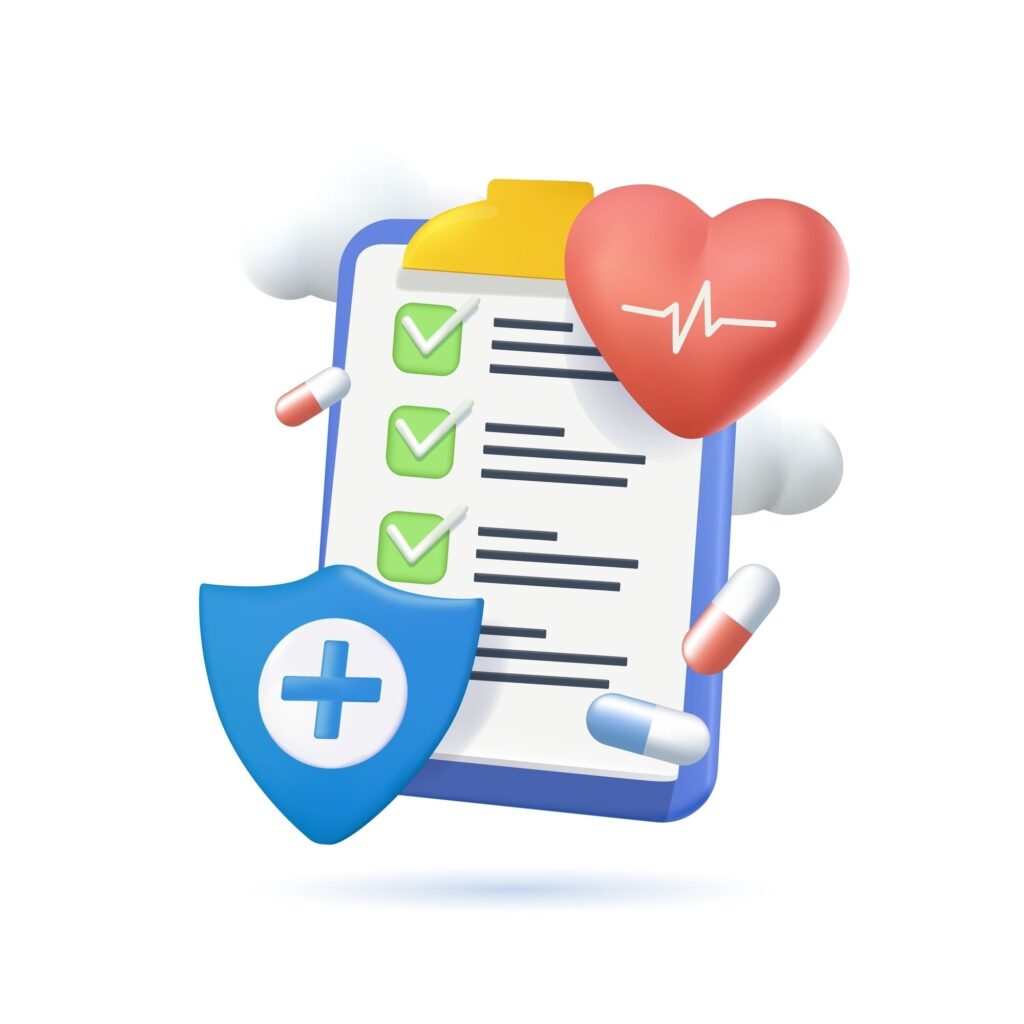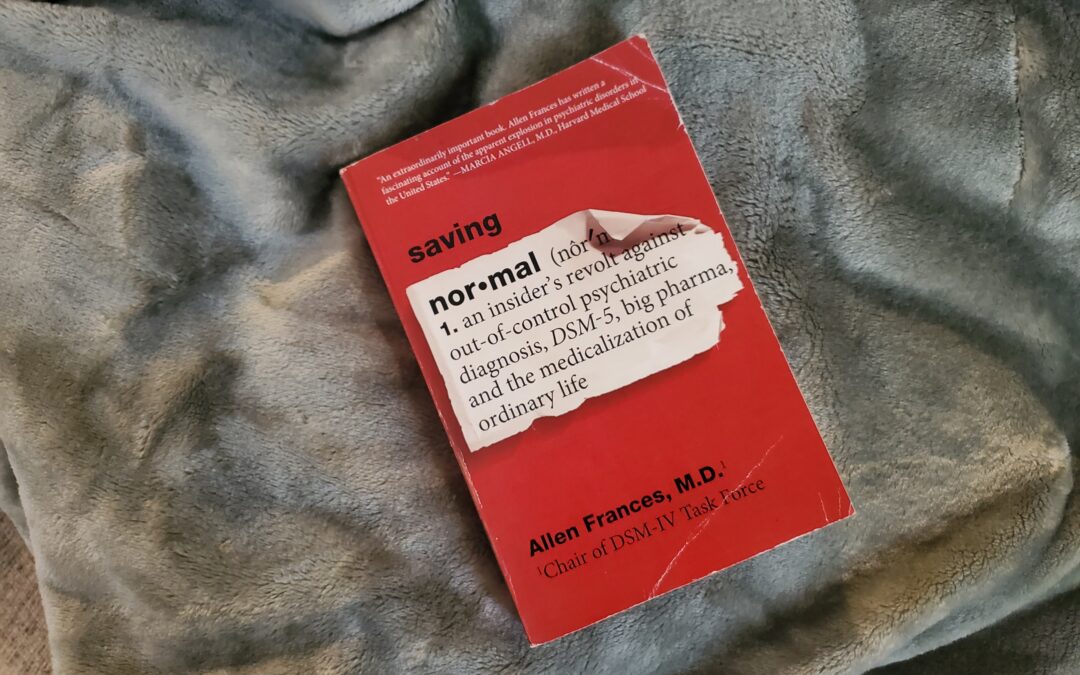This above photo is my personal copy of Saving Normal by Allen Frances, MD. I love this book because it really explains how we have come to medicalize ordinary life. Dr. Frances goes into account firsthand with direct experience of the development of the DSM-IV to the DSM V and how things have gone too far in the mental health world (DSM = Diagnostic Statistical Manual – Book used in US to diagnosis mental health disorders). When people go into a therapist’s, doctor’s or psychiatrist’s office and question the number of diagnoses they are receiving along with the strong recommendation for medication, this book helps validate their experience of questioning is this correct response to my mental health concern.
In today’s day and age, receiving a mental health diagnosis is starting to become more and more about medicalizing responses to everyday stresses, a tough challenge in a person’s life, or potential physical imbalances. The second you’re diagnosed by a professional, you carry around a label. As if who you are is both quantified and qualified by the sign that hangs around your neck. This label is part of your permanent health record and depending on other factors, can also affect academic records, insurance policies, and career aspirations. It adheres itself to your medical records and follows you around from doctor to doctor indicating who you are and how you should be treated.
What’s unfortunate about this is the fact that a lot of health professionals have so many demands on their time, that a quick look at your chart and a 10-minute visit with you is all they have time for in order to determine the best way to help you. Doctors today want to have the time to sit with you, gain insight into your experiences and symptoms, and find a path of healing that is a good fit for you but can’t because of the differing demands of our medical system. So what ends up happening more and more is short  appointments with only a few minutes of time to ask you how you’re feeling and if you need a medication refill.
appointments with only a few minutes of time to ask you how you’re feeling and if you need a medication refill.
In truth, the entire US medical system is a bit broken whereas an insurance company requires a quick diagnosis in order to reimburse a provider and therapists may feel obligated to offer one in order to get paid. On several occasions, I have spoken to several MD’s from the European Union that were surprised by this. They said it is common practice to not give a formal diagnosis or to give a diagnosis after a good amount of time getting to know the patient.
But the reality is that mental health diagnoses are given out too often and in some instances they can be wrong. Often, when a person goes to therapy with a concern, it is a completely appropriate response to the situations in their lives. Yet, he, she, or they are “medicalized” and handed a diagnosis as both a blanket explanation for what they are dealing with and as an acquiescence to the healthcare system.
I know my stance is coming across strongly here, but my feelings that there is a tendency to over diagnose mental health concerns were confirmed when I read the book Saving Normal by Allen Frances, MD.
Doctor Frances was the key person in the formation of the DSM IV, the diagnostic manual that mental health professionals in the US use to give their clients and patients official diagnoses. And while he absolutely defends the necessity for some mental health diagnoses, he also argues the point that we are now medicalizing ordinary life.
According to Dr. Frances, perfectly normal emotional responses like sadness and worry are frequently over-diagnosed as depression and anxiety. What’s more, the author goes on to express the fall out of this medicalization.
Not surprisingly, when you hear discouraging news from a medical professional, you tend to take it to heart. Also, when you receive a diagnosis, you may start to succumb to the stigma and start believing all the negative ideas attached to the diagnosis actually apply to you. It’s as if the diagnosis shakes your belief in yourself. So much so, that eventually you may outsource your power to the medical professionals and forget about the strength and resiliency you already possess.
But the truth is, it’s understandable to place your trust in doctors and therapists. And it’s good to hear what they have to say, but also to remember that you are an expert on yourself. A lot of people want simple answers to what is going on with their thoughts, feelings, and emotions and they are willing to accept a diagnosis if it means making progress or getting help.
The problem comes, however, when you give up your personal power and propensity for self-healing for the sake of checking a box on an insurance form.
Yes, going through life worried or unhappy is unpleasant and can be a struggle, but when you acknowledge the circumstances in your life that have brought about these reactions, and are compassionate toward yourself, you’ll see that normal responses to life’s circumstances and experiences do not always require a formal diagnosis.
Continuing on a Medicalized Path
The biggest downside of continuing to over-diagnose mental health issues is that it takes the autonomy away from the individual and places it in the healthcare system. A system that is large and often broken to some degree.
By immediately labeling you as abnormal, you instantly become an outlier and struggle to see yourself as a functional person. Instead, you’ll define yourself by your diagnosis and limit your potential to overcome your struggles.
At the very least, you may feel like someone who doesn’t belong. Like you are inherently different from or worse than those who do not carry around a diagnosis with them. This keeps you in a place of living with or managing your condition rather than taking control of your emotional experiences and giving yourself what you need to move forward and heal.
Living this way keeps you from embracing your experiences for what they are and learning from them.
Moving Beyond the Medical Model
It’s natural to trust the experts. While it can be easy to put all of your faith in mental health professionals, there is something to be said about your own intuition and self-knowledge.
Often when clients seek Integrative Therapy here at Connecticut Integrative Counseling, they are bringing with them a diagnosis they have received from another therapist or doctor. However, they’ve sometimes doubted whether the diagnosis is accurate or felt like it was slightly off.
When you start to look at your thoughts, emotions, and behaviors as a form of communication, you can begin to decipher what it is they are trying to tell you. Perhaps you have too much stress in your life, maybe you are grieving, or its possible you have an underlying medical condition.
By tuning into what your brain and body have to tell you, you can embrace the idea that your mental health diagnosis does not define you. When this happens, you’ll be able to cultivate self-compassion and progress past your challenges.
The Three Most Important Takeaways from Saving Normal
It true that doctors and mental health professions have years of education and extensive training. They are skilled at understanding people and their lives. Unfortunately, though, they must work within a system that emphasizes symptoms rather than experiences.
According to Dr. Frances, the key to moving through an overly-medicalized mental health system is remembering to be confident in yourself and your ability to restore your own balance.
Here are the three most important points from his book, Saving Normal:

1. People are Naturally Resilient
One of the main points that Dr. Frances argues is that people have a natural tendency to want to get better. They want their thoughts, emotions, and behaviors to return to a regular state that is joyful and happy for them.
The difference lies with those who have genuine psychiatric disorders. True disorders do not correct themselves and thus the people who suffer from them require medical intervention. However, this is a small percentage of the population. Most people who are in pain or having challenges are having typical reactions to experiences in their lives.
2. Mental Health Should Be Helpful
Because people are naturally resilient and have the ability to heal themselves, Dr. Frances argues that the point of mental health care should be to aid people in getting back to their regular state rather than pathologizing them.
Instead of medicalizing every problem a person has; a mental health professional should be guiding them to find coping skills that work to address their issues as well as making more appropriate lifestyle choices. As opposed to assuming every risk factor is a sure sign of disease, mental health professions would do better to help their clients and patients integrate their life experiences.
3. Life Includes a Full Range of Emotions
The final takeaway from Saving Normal is the idea that without experiencing the depth of every emotion, humans are not whole beings. For example, when you lose a loved one, it is normal to feel loss, sadness, and grief. In fact, if you didn’t, people would probably think there was something wrong with you. However, according to the most recent diagnostic manuals, these emotions can be criteria for a medical diagnosis.
What I hope you take away from this article is that it is perfectly acceptable to go through a rough patch, just as it is normal to have times in your life when you are elated, thrilled, and over the moon. There is nothing wrong with you for fully experiencing life’s challenges, just as it is OK to experience complete joy. For without knowing one, it is impossible to know the other.
Moving beyond the medical model can free you up for a much more self-guided healing journey. But that doesn’t mean you still might not benefit from direction and expertise. Here at Connecticut Integrative Counseling, I don’t take insurance so that we can go on a healing path instead of focusing if we have the right diagnosis.
You absolutely can identify the life circumstances that are causing you stress or pain. And you have the power to determine if your reactions are within the normal scope or if you need more serious medical intervention. Connecticut Integrative Counseling can help. Please schedule a phone consult today if this blog post resonates with you.


